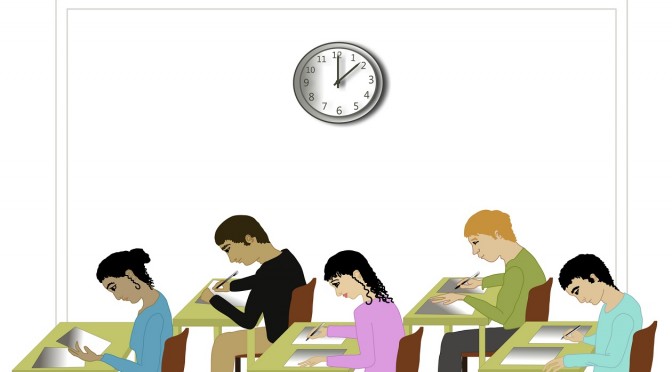 We often hear from parents that “my child doesn’t test well.”
We often hear from parents that “my child doesn’t test well.”
Teens have lots of excuses for their grades, and blaming it on the test is one that parents fall for all the time.
In the A+ Club, we measure middle, high school and college student success on a test or major assessment in terms of 1) identifying teacher expectations; 2) student preparation; and 3) successful execution on the test day.
Testing is not a stand-alone skill. Called by educators, a “summative” assessment, a formal test is supposed to measure the outcome of the larger Learning Process by which students build new knowledge. If your child doesn’t “test well” — it’s not just the test, it’s more likely a combination of things that aren’t adding up to the success you’d like your child to achieve on the test day.
Poor testing generally doesn’t mean poor testing skills, it means poor test preparation skills. When we look at a student’s performance on a test, we ask about the three basic components of successful test-taking:
-
Were there any surprises?
-
Were you prepared?
-
Did you have time to finish?
That’s easy enough, right? Well, not really. In the three upcoming blog posts I will discuss each of these important aspects of successful test taking.
The core ideas we will discuss are:
1. If there were any surprises, then the student did not know what to expect on the test.
You can’t prepare for what you don’t know is coming at you.
This could be because of the teacher’s or the student’s lack of clarity in advance of the test, but, either way, a student can not succeed on a test if the expectations of that test are unclear.
Ways to identify test questions include: 1) make use of study guides; 2) identify who wrote the test: the teacher, the textbook or someone else; and 3) listen to your teacher during the days before the test, as teachers are often thinking out loud about it.
2. Students preparation
This does NOT mean cramming, as learning is not accomplished in a single night of memorization.
Learning is an ongoing process of taking on new knowledge, applying prior knowledge, and practicing it until it is fully understood. The quick test to see if your child is prepared for a test is to ask him or her to teach it to you, for You can’t teach what you don’t know.
What we want from students is meaningful preparation that helps them be ready to show their learning on the test. If a student understands a concept but cannot perform it by him or herself, then that student is not prepared. Kids frequently “get it” when their teacher shows them but still can’t perform it by themselves, which, after all, is what a test is about.
3. The more prepared the student, the less likely the student is to run out of time or have other problems while taking the test.
This doesn’t mean the student won’t run out of time. Students should always skim through a test completely and read instructions fully before starting. This will help clarify expectations and, often, they will see that different parts of the test actually help answer each other.
And if time is a concern, students can prioritize questions by degree of difficulty or length and time themselves according to those estimates. If time is a constant problem, parents should speak to teachers and counselors about special accommodations for extended test-taking time. Some students are naturally deliberate or process information at different speeds.
Test-Taking Success
My goal in these next three blog posts is to provide parents with some helpful background information and ongoing strategies for helping their teenage middle and high school students perform better on test.
– Michael

3 thoughts on “A Successful Assessment: how to approach a test (or why doesn’t my child test well?)”